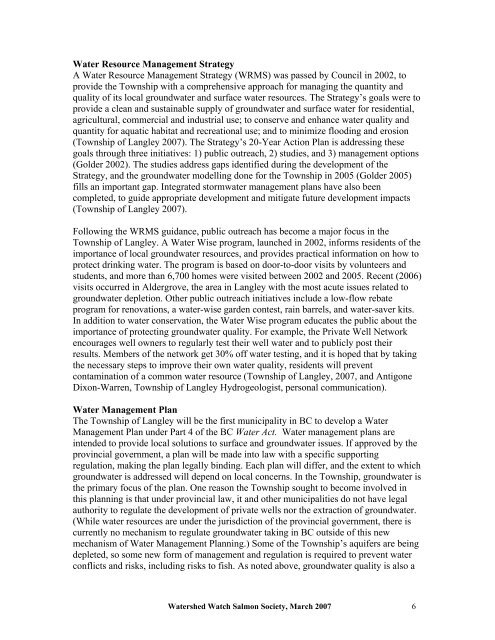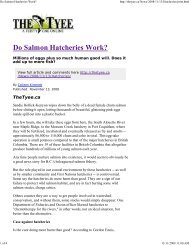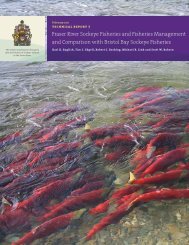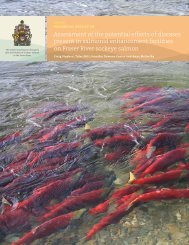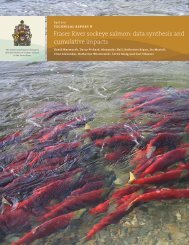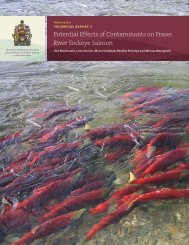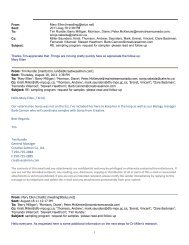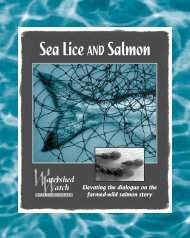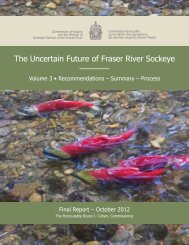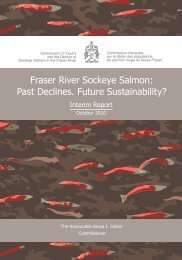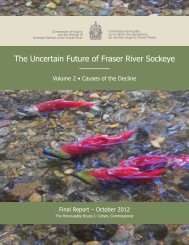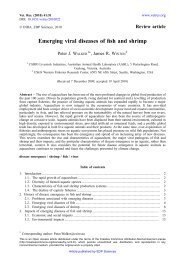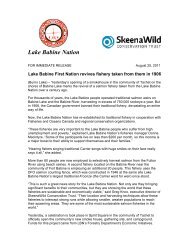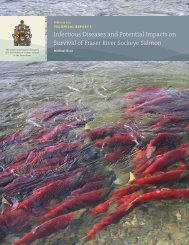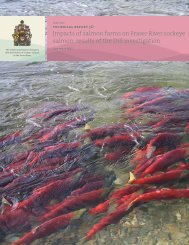Township of Langley Groundwater Management: Case Study
Township of Langley Groundwater Management: Case Study
Township of Langley Groundwater Management: Case Study
Create successful ePaper yourself
Turn your PDF publications into a flip-book with our unique Google optimized e-Paper software.
Water Resource <strong>Management</strong> Strategy<br />
A Water Resource <strong>Management</strong> Strategy (WRMS) was passed by Council in 2002, to<br />
provide the <strong>Township</strong> with a comprehensive approach for managing the quantity and<br />
quality <strong>of</strong> its local groundwater and surface water resources. The Strategy’s goals were to<br />
provide a clean and sustainable supply <strong>of</strong> groundwater and surface water for residential,<br />
agricultural, commercial and industrial use; to conserve and enhance water quality and<br />
quantity for aquatic habitat and recreational use; and to minimize flooding and erosion<br />
(<strong>Township</strong> <strong>of</strong> <strong>Langley</strong> 2007). The Strategy’s 20-Year Action Plan is addressing these<br />
goals through three initiatives: 1) public outreach, 2) studies, and 3) management options<br />
(Golder 2002). The studies address gaps identified during the development <strong>of</strong> the<br />
Strategy, and the groundwater modelling done for the <strong>Township</strong> in 2005 (Golder 2005)<br />
fills an important gap. Integrated stormwater management plans have also been<br />
completed, to guide appropriate development and mitigate future development impacts<br />
(<strong>Township</strong> <strong>of</strong> <strong>Langley</strong> 2007).<br />
Following the WRMS guidance, public outreach has become a major focus in the<br />
<strong>Township</strong> <strong>of</strong> <strong>Langley</strong>. A Water Wise program, launched in 2002, informs residents <strong>of</strong> the<br />
importance <strong>of</strong> local groundwater resources, and provides practical information on how to<br />
protect drinking water. The program is based on door-to-door visits by volunteers and<br />
students, and more than 6,700 homes were visited between 2002 and 2005. Recent (2006)<br />
visits occurred in Aldergrove, the area in <strong>Langley</strong> with the most acute issues related to<br />
groundwater depletion. Other public outreach initiatives include a low-flow rebate<br />
program for renovations, a water-wise garden contest, rain barrels, and water-saver kits.<br />
In addition to water conservation, the Water Wise program educates the public about the<br />
importance <strong>of</strong> protecting groundwater quality. For example, the Private Well Network<br />
encourages well owners to regularly test their well water and to publicly post their<br />
results. Members <strong>of</strong> the network get 30% <strong>of</strong>f water testing, and it is hoped that by taking<br />
the necessary steps to improve their own water quality, residents will prevent<br />
contamination <strong>of</strong> a common water resource (<strong>Township</strong> <strong>of</strong> <strong>Langley</strong>, 2007, and Antigone<br />
Dixon-Warren, <strong>Township</strong> <strong>of</strong> <strong>Langley</strong> Hydrogeologist, personal communication).<br />
Water <strong>Management</strong> Plan<br />
The <strong>Township</strong> <strong>of</strong> <strong>Langley</strong> will be the first municipality in BC to develop a Water<br />
<strong>Management</strong> Plan under Part 4 <strong>of</strong> the BC Water Act. Water management plans are<br />
intended to provide local solutions to surface and groundwater issues. If approved by the<br />
provincial government, a plan will be made into law with a specific supporting<br />
regulation, making the plan legally binding. Each plan will differ, and the extent to which<br />
groundwater is addressed will depend on local concerns. In the <strong>Township</strong>, groundwater is<br />
the primary focus <strong>of</strong> the plan. One reason the <strong>Township</strong> sought to become involved in<br />
this planning is that under provincial law, it and other municipalities do not have legal<br />
authority to regulate the development <strong>of</strong> private wells nor the extraction <strong>of</strong> groundwater.<br />
(While water resources are under the jurisdiction <strong>of</strong> the provincial government, there is<br />
currently no mechanism to regulate groundwater taking in BC outside <strong>of</strong> this new<br />
mechanism <strong>of</strong> Water <strong>Management</strong> Planning.) Some <strong>of</strong> the <strong>Township</strong>’s aquifers are being<br />
depleted, so some new form <strong>of</strong> management and regulation is required to prevent water<br />
conflicts and risks, including risks to fish. As noted above, groundwater quality is also a<br />
Watershed Watch Salmon Society, March 2007 6


